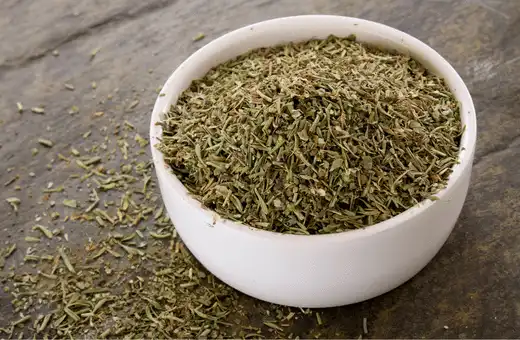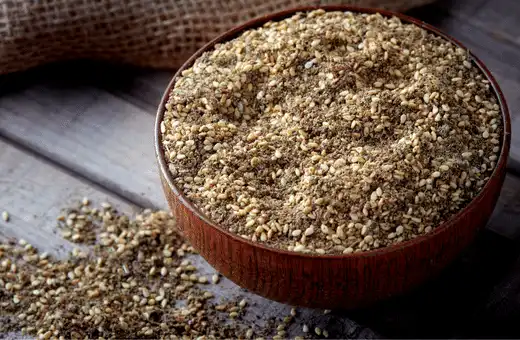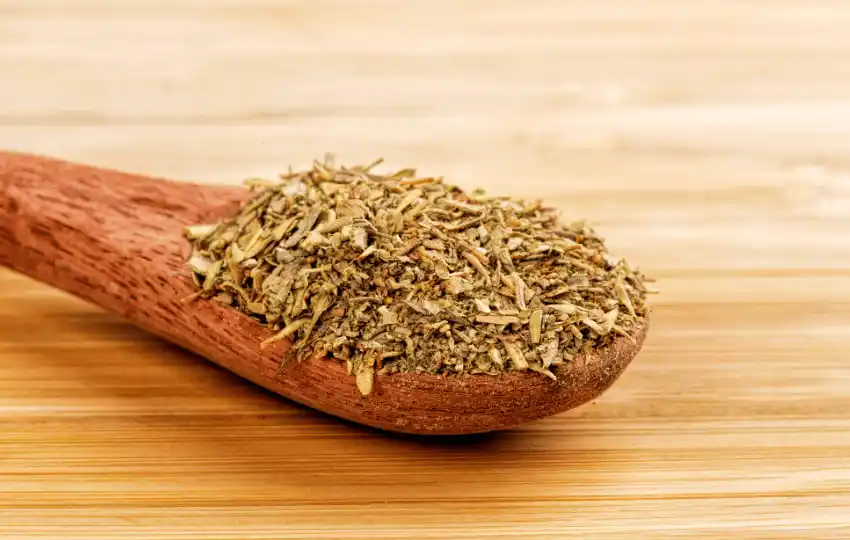If you’re an experienced cook, then you know that Italian seasoning is one of the most versatile herbs in your pantry.
It’s a combination of herbs and spices that adds a kick to any dish, from pasta sauces to grilled meats. But what do you do when you’re out of Italian seasoning?
Don’t worry—there are plenty of great substitutes that can do the trick. Read on for some ideas on what you can use in place of Italian seasoning!
Read more: Best pasta water substitutes
What is Italian seasoning made of?
Italian seasoning is an extraordinary blend of herbs that can be used to add a unique and unmistakable flavor to any dish.
This flavorful combination typically includes basil, oregano, rosemary, thyme, marjoram, and sometimes sage.
Each herb has its own unique taste profile, and when combined, they create a robust mix that provides a sophisticated depth of flavor.
To make Italian seasoning, you simply mix the chosen herbs together in whatever ratio you prefer – it truly is that easy!
Whether you bring this traditional blend of herbs directly from Italy or make your own approximation with common spices readily available in most kitchens.
However, Italian seasoning is definitely an ingredient worth adding to any recipe for a delicious twist on the classic meal.
Best Italian Seasoning Substitutes you Should Try
1. I use mixed herbs instead of Italian herbs
If you are in a rush or simply don’t have any Italian seasoning on-hand, then mixed herbs make an excellent substitute.
As the name suggests, this blend consists of various herbs like oregano, thyme, marjoram, and sage.
Each of these herbs provides a unique flavor to dishes, and it is easy to customize the mix, ensuring your dish comes out just right!

Just make sure that if you’re using mixed herbs as a replacement for Italian seasoning, use less than what is called for since its flavor profile can be stronger.
Mixed herbs are excellent in salads, sauces, and stews, although they do not quite provide the same punch as Italian seasoning.
2. Fresh Herbs
Fresh herbs are a great alternative to Italian seasoning and can take dishes to the next level.
Not only do the flavors of the individual herbs provide delicious flavor profiles but combining them with other ingredients like garlic, onion, and bell peppers can create amazing complexity.
Additionally, fresh herbs tend to retain their nutrients better than store-bought seasonings for more health benefits.
Whether it’s sage, oregano, thyme, or rosemary, sprinkling on some herbs at the end of cooking (rather than adding them in earlier) helps keep their flavors from dissipating.
Next time you’re out of Italian seasoning, try your hand at creating a blend of fresh herbs! You won’t regret it.
3. Herbs de Provence
Herbs de Provence is a classic French herb blend that originated in the Provence region of France. It is a mix of dried herbs, including rosemary, thyme, oregano, savory, and lavender.
The mixture was originally created to season the hearty dishes common in this area of France.
Herbs de Provence is commonly used to season lamb, pork, poultry, and fish. The herb blend is also delicious, sprinkled over grilled or roasted vegetables, soups, stews, sauces, and salad dressings.
To give the herbs a more intense flavor, try lightly toasting them before adding them to your dishes.
Herbs de Provence can also be made at home with a few simple ingredients.
Simply mix together equal parts of dried thyme, rosemary, oregano, savory, marjoram, and lavender to make your own Herbs de Provence spice blend.
For a simple seasoning solution to everyday dishes, store-bought blends of Herbs de Provence can be found in most well-stocked grocery stores.
4. Italian Herb Blend
If you don’t have the individual herbs needed for the above combination, then an Italian herb blend may be a good option for you.
This blend typically includes oregano, rosemary, thyme, marjoram, and basil — all classic ingredients in traditional Italian cooking.
It also contains garlic powder, so you don’t have to worry about adding it separately.
This blend can be added directly to dishes like soups and stews or used as part of a dry rub on meats before cooking them in the oven or on the grill.
5. Pizza seasoning
If you are looking for an alternative to Italian seasoning, then Pizza seasoning might be a perfect substitute.
This combination of herbs and spices is usually composed of oregano, garlic powder, thyme, basil, and red pepper flakes.
Some manufacturers also add onion and salt to round out the flavor.
It can add a bold, flavorful taste to classic Italian-style dishes such as pizza, lasagna, and spaghetti.
In addition to the more traditional recipes mentioned above, Pizza seasoning can be used in other Mediterranean-style dishes like couscous and hummus.
It’s sure to take any meal up a few notches on the flavor scale!
6. Oregano
Oregano is one of the main ingredients in Italian seasoning, and it makes sense to use it as a substitute if you don’t have Italian seasoning on hand.
It has a robust flavor and aroma that will give your dish an authentic Mediterranean taste.
When using oregano as a substitute for Italian seasoning, remember to use less than the amount specified in the recipe, as oregano has a stronger taste than Italian seasoning.
7. Basil
Basil is another popular herb used in Mediterranean cuisine, and it’s also an ideal substitute for Italian seasoning.
Its sweet flavor pairs well with tomatoes, garlic, and olive oil–all ingredients commonly found in Italian dishes.
Basil also has anti-inflammatory properties and is rich in antioxidants, making it a healthy alternative to traditional seasonings like salt or sugar.
Just like with oregano, be sure to use less basil than what’s called for in the recipe, so your dish doesn’t become too overpowering.
8. Rosemary
Rosemary is another herb often used in Mediterranean dishes, and it’s an excellent substitute for Italian seasoning.
Its earthy flavor works well with many other herbs like oregano and basil, and it adds depth to sauces or marinades.
And unlike other herbs like thyme or sage, which can be overpowering if too much is used, rosemary blends nicely with other flavors without dominating them–so feel free to add more than what’s called for in the original recipe!
9. Greek seasoning
Greek seasoning is an excellent alternative to Italian seasoning, as the herbs and spices used are similar but have their own unique flavor.
It typically includes oregano, thyme, marjoram, basil, garlic, onion powder, and pepper. It is easy to make at home with fresh herbs, or store-bought blends of Greek seasoning are widely available.
The slightly different flavor of Greek seasoning pairs well with many types of dishes and allows you to experiment with different blends or flavors.
You can add a bit of heat by using a touch of cayenne pepper or chili powder for added depth of flavor.
From tomato-based sauces to chicken Parmesan and more, the flavors of Greek seasoning will bring out the best in any classic Italian recipe.
With its rich flavor profile, Greek seasoning is a go-to for anyone looking to bring faux-Italian flavors to the dinner table.
10. Creole Seasoning+ Greek Seasoning
For those looking for something a bit different with the same delicious Italian flavors, blending Creole Seasoning and Greek Seasoning is a great choice.
The combination of herbs, including oregano, basil, and thyme, found in both seasonings brings out a bold and complex flavor that can be used to bring Italian dishes to life.
Best of all, this recipe is versatile, so add or subtract ingredients to perfectly customize the desired flavor profile.
With the use of Greek and Creole seasonings working together, we’ve got something special to replace Italian seasoning!
This combination is perfect for grilling meats, adding heat to cooked dishes, or accentuating the flavors of your favorite pasta.
Plus, it’s incredibly easy to make: simply combine ¼ cup of Creole Seasoning with ¼ cup of Greek seasoning, and you’re ready to cook up some amazing Italian-style food.
Whether you’re making pizza at home or prepping some lasagna for dinner guests, this satisfying blend will provide just the right amount of taste and aroma.
11. Za’atar
If you are searching to add a bit of spice and flavor to your dish without going for traditional Italian seasoning, Za’atar is the way to go.
This blend of herbs and spices originated in the Middle East but has quickly become popular all over the world.

With its unique combination of oregano, sumac, sesame seeds, and more, it brings incredible taste and aroma to any dish.
Whether it is a roasted vegetable medley or just some hard-boiled eggs, sprinkle a bit of Za’atar on top for an added zing. Once you start using this flavorful substitute, you won’t be able to stop!
How do you make Italian seasoning at home?
i. Garlic Powder + Oregano + Basil + Thyme
This combination of herbs gives you a great approximation of the flavors found in Italian seasoning. Garlic powder adds a mild garlic flavor, oregano adds a woodsy taste, and basil brings out a sweet earthiness.
Finally, thyme adds an herbaceous note that rounds out the flavor profile nicely. This combination is great for adding sauces or marinades for meats, poultry, fish, and vegetables.
ii. Oregano with Dried Basil Leaves and Thyme
For those looking for an Italian seasoning option without having to buy a pre-packaged mix, oregano and basil are a great combination.
Adding a hint of thyme gives a unique depth of flavor that will really bring any recipe to life.
This flavoring trifecta is a wonderful way to add the typical Italian seasoning flavors with ingredients that are widely available in stores, pantries, and gardens around the world.
An added bonus — you get the freshest flavors from your homegrown herbs! Enjoy this full-flavored blend next time you are making an Italian dish.
Together, these three herbs create a flavor profile similar to traditional Italian seasoning.
The oregano brings an herbal aroma while the basil leaves provide a pungent and slightly sweet taste, and the thyme adds a woody flavor with a hint of mint that balances it all out perfectly.
With this combination of herbs, you can replicate classic Italian recipes without breaking your pocket or running to the store for specialized seasoning.
FAQs on Italian seasoning substitute
Q1. What are the main Italian spices?
The main Italian spices used in traditional cooking are oregano, basil, rosemary, thyme, garlic, and onion. These herbs and spices can be used to add flavor to a variety of dishes such as soups, sauces, stews, pizza, and pasta.
Each spice brings its own unique flavor, which can really enhance the taste of a dish. Oregano is most commonly used in tomato-based dishes, while basil is often found in pesto, sauces, and salads.
Rosemary adds an earthy flavor to meats and vegetables, while thyme brings out the rich flavors of beef and pork dishes. Garlic and onion are staples in Italian cooking that can be used to add flavor to just about any dish.
Using these spices can help bring out the best in Italian cooking and give your dishes that classic Italian taste.
Other popular Italian spices include sage, nutmeg, bay leaves, paprika, and chili flakes. These are all used to give dishes a nice depth of flavor, with the chili flakes providing a spicy kick to balance out the other flavors.
With these herbs and spices, you can easily recreate traditional Italian recipes in your own kitchen.
Q2. Can I substitute Italian seasoning for oregano?
Yes, Italian seasoning can be used as a substitute for oregano in some dishes. Italian seasoning is a blend of several herbs and spices that often includes oregano but may also include basil, thyme, marjoram, rosemary, garlic powder, onion powder, red pepper flakes, and more.
Some recipes require the distinctive flavor of oregano and may not work as well with Italian seasoning, so it’s best to check the specific ingredients in the recipe. In general, however, substituting Italian seasoning for oregano is usually an acceptable option.
Moreover, if using Italian seasoning instead of oregano, reduce the amount called for by about half since Italian seasoning is usually more strongly flavored than oregano. Taste the dish before serving and adjust the amount of seasoning if needed.
Additionally, you can make your own Italian seasoning blend at home using a variety of herbs and spices. This will allow you to customize the flavor profile to suit your taste preferences.
Q3. Are thyme and Italian seasoning the same?
No, thyme and Italian seasoning are not the same. Thyme is an aromatic herb related to oregano and mint and is used widely in Mediterranean cuisine. It has a mild lemony flavor with hints of cloves and pepper.
Italian seasoning, on the other hand, is a combination of herbs, including oregano, basil, rosemary, and sometimes thyme. This is a more robust flavor that is commonly used in Italian-American cuisine.
Each of these herbs contributes its own unique flavor to the seasoning blend, so although they may contain some similar ingredients, thyme and Italian seasoning are not the same. They are each used to flavor different dishes and should not be substituted for one another.
Ultimately, the best way to determine which herb is right for your dish is to taste them both and decide which flavor you prefer. Thyme can be used for grilled vegetables, fish, and poultry, while Italian seasoning can be used in sauces, soups, and pasta dishes. Both can be used to create flavorful seasonings for many types of savory dishes!
Q4. Can I substitute Italian dressing mix for Italian seasoning?
No, Italian dressing mix and Italian seasoning are two different things. Italian dressing mix is a combination of seasonings such as garlic, onion, oregano, basil, parsley, and other spices and herbs used to make Italian salad dressings.
Italian seasoning, on the other hand, is usually a blend of herbs like oregano, thyme, rosemary, and basil.
So, while Italian dressing mix may contain some of the same ingredients as Italian seasoning, they cannot be substituted for one another.
To get an authentic flavor in a dish that calls for either ingredient, it’s best to use what is specified.
Italian dressing mix will give a dish more of a tangy, acidic taste, while Italian seasoning will lend an earthier and herbal flavor. If you don’t have either ingredient, it’s best to omit or replace it with herbs that are similar in flavor.

